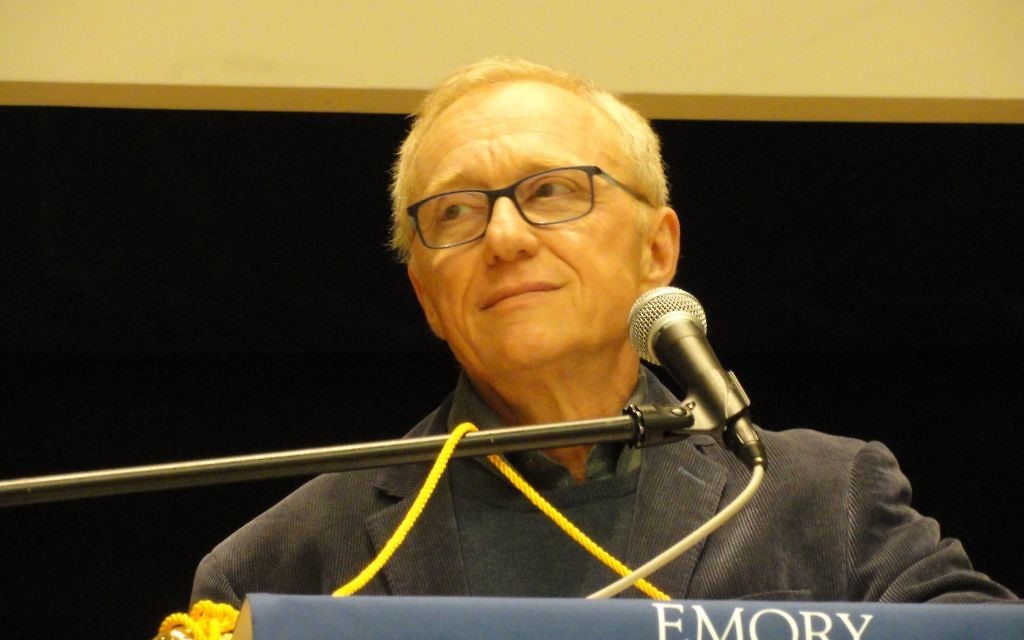Author: Horrific Past Haunts Israel’s Future
David Grossman tackles Israeli-Palestinian conflict in latest book
David Grossman’s little boy came home from kindergarten one day, shaken and terrified, after the Holocaust was taught in class that morning.
“He asked me, ‘Why did they do what they did?’ And I, who wrote the book about a child deprived of knowing about it (“See Under: Love,” 1986), found myself reluctant to talk to him,” the Israeli author said during an appearance at Emory University.
The subject of protecting children from harsh reality comes up frequently in his books. “It is a naive, pure child,” he said. “If he knows what people are able to do to other human beings, the option of human brutality and cruelty, then his pure, childlike mind will be polluted forever. Inside he will never be the child he was.”
Get The AJT Newsletter by email and never miss our top stories Free Sign Up
Grossman’s talk, “The Holocaust’s Carrier Pigeon: Reflections on Writing and Memory,” was the annual Tenenbaum Family Lecture in Judaic Studies on Tuesday, Feb. 28. A winner of multiple awards, Grossman has written more than a dozen works of fiction and nonfiction.
“Parents in other, more normal places on Earth find themselves confused and embarrassed when they have to tell their children about facts of life, while we first have to deal with the facts of death that are so entangled in our destiny,” he said.
Grossman said he is haunted by a World War II incident he heard about long ago in which two kids were picked up from a playground and carted off to an extermination camp. He lamented “the unbearable lightness in which a Jew can be uprooted” and said Jews always feel like foreigners, regardless of where they are.
“This existential lack of confidence is the most typical of symptoms of the Jewish condition,” he said. “For thousands of years we Jews do not feel at home in the world. It prevails even (after) 69 years in our sovereign home — a kind of deep foreignness of the Jews among other people, a solitude in which what happened with the Shoah was just the most extreme and most murderous expression.”
It’s a self-perpetuating problem, Grossman said. “Time and again you see the youngsters of Israel, who should be liberated from the anxieties of their parents and grandparents, … struggling with the memory of the Shoah. They’re almost doomed to go back to it. So many of us are still like that, the carrier pigeon of the Shoah. It will be hard for Israelis to get rid of the anxieties of the past that are ingrained in them and from the distortions of war and violence.”
Just as the past looms large for Israelis, he said, the future is in question. “We have a glorious past, traumatic sometimes and tragic; a very agitated present; and yet the idea of the future is frail and problematic for us. Others can be sure about the future of their country — the Dutch, Belgians, the Americans — if it even occurs to them. No Israeli will think of the future without an unpleasant feeling of hesitation.”
Not having permanent boundaries is a huge part of Israel’s problem, Grossman said. “I dream of a time when Israel will a have a fixed border recognized by the U.N. and the whole world, including Arab countries. This is so important.”
Though Israel has “enormous military might,” the country settles for mere survival and seems unable to take calculated risks that would “create a situation in which gradually the conflict with our neighbors will be solved, and then and only then will we feel at home in the world.”
A supporter of Palestinian rights, Grossman added, “My hope is that settling the problem between us and our neighbors could cure a deep disability in the sense of our acceptance into some normalcy — political, universal normalcy — that we have been deprived of for centuries.”
He concluded: “In every man there is an active woman, even if he doesn’t know it, and vice versa. In every old person there is a child; also in every child there is an old person. In every sane human being there is an insane one. I will go one step further: In every Israeli there is a Palestinian, and vice versa. We are practical people, and we have to act practically.”





comments